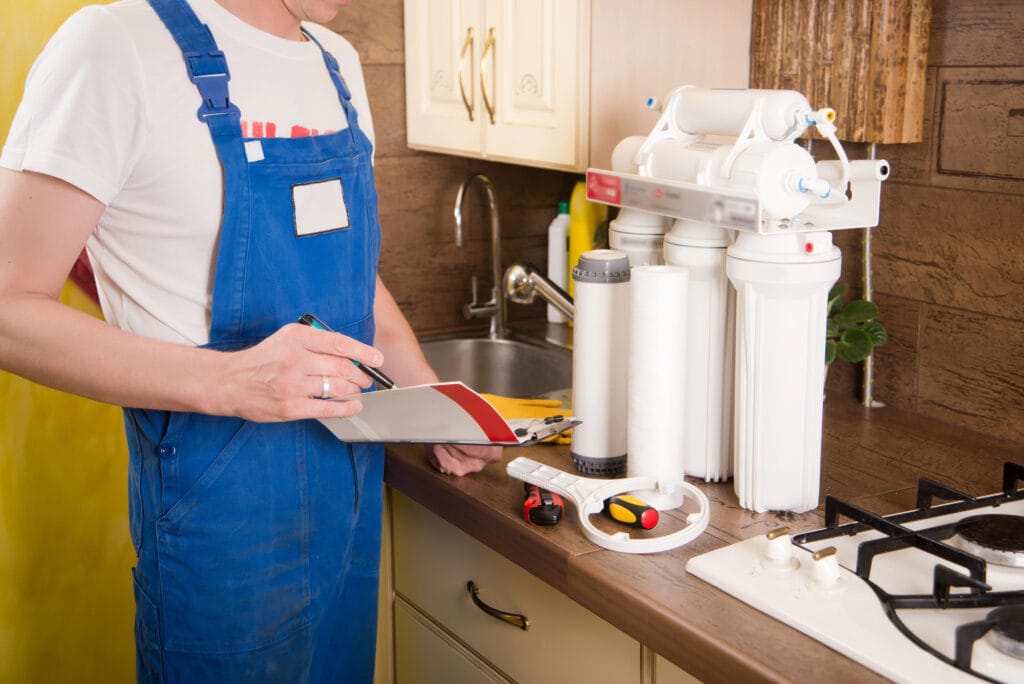Central Coast residents may often notice chlorine taste, odours, or water discolouration that lead them to question the quality of their tap water.
Drinking water in the Central Coast region is treated to remove contaminants, but natural minerals and added substances can still affect its taste and smell. Authorities regularly test for bacteria like E. coli and monitor chemical levels to keep the supply safe for drinking and bathing, but levels considered safe in one country may be considered unhealthy in another.
As more research comes to light about overall health and well-being, it’s fair to proceed with caution around additives and contaminants. While much of the assessment and quality control is done outside the reach of everyday consumers, there are ways residents can take control and have a say in water quality in their homes.
What Is Water Quality and Why Should You Care?
Water quality is the measure of water condition based on physical, chemical, and biological characteristics. It is analysed for factors like clarity, presence of contaminants, and levels of minerals.
Clean water is essential for family health and well-being. On the Central Coast, water is drawn from local rivers, creeks, and dams before being treated and delivered to homes.
Common reasons for monitoring water quality include:
- Preventing waterborne diseases
- Detecting heavy metals or pesticides
- Protecting local ecosystems
The Central Coast Water Board and the Environmental Protection Authority (EPA) monitor water supplies to manage risks like urban runoff, pollution, and natural contaminants. High-quality water is needed for safe drinking, cooking, bathing, and maintaining waterways.
Clean water supports every part of daily family life — from safe drinking and cooking to healthier skin, cleaner clothes, and a hygienic home. Contaminants like chlorine, heavy metals, and bacteria can affect everything from taste to long-term health, especially for young children or those with sensitivities.
Families rely on safe water every day, so any decline can impact children, adults, and pets.
Regular testing keeps local water in line with national standards and helps avoid problems before they reach households. Safe water also supports the local environment, protecting aquatic habitats and wildlife. Poor water quality can damage local waterways, affect recreation and fishing, and harm agriculture.


Central Coast Water: The Basics
Drinking water on the Central Coast comes from a combination of rivers, creeks, dams, and groundwater bores. Key sources include Mardi Dam, Mangrove Creek Dam, and Mooney Mooney Dam. These sources provide water to both the Mardi and Somersby Water Treatment Plants.
The region’s water supply is supported by large infrastructure, ranking as the third largest in New South Wales. WaterNSW manages much of the region’s catchments, with additional resources sometimes supplemented by Warragamba Dam or, in dry conditions, supplies from the Sydney Desalination Plant.
Once sourced, water undergoes several treatment steps before reaching homes. Important stages include coagulation, flocculation, sedimentation, filtration, and disinfection. During these stages, substances like chlorine are added to disinfect, and fluoridation is included for dental health.
Regular monitoring tracks water quality, taste, and odour. Sediments, naturally found in river and dam water, are removed during processing. In some cases, chemical treatments are used to address metals like manganese or to prevent pipe corrosion.
The final water delivered is clear, treated, and neutralised for pH to protect pipes and deliver safe drinking water. Chlorine, sediment, and traces of minerals or treatment chemicals are present, but controlled at levels considered safe for consumption.
Is It Safe to Drink?
According to Australian National standards, Central Coast tap water is safe to drink.
Regular water testing is performed by the council and independent laboratories. Testing focuses on contaminants, including heavy metals (such as iron and manganese), as well as bacteria, pollutants, and residue from urban runoff.
Chemicals like Chlorine (for disinfection) and Fluoride (for dental health) are added for consumer protection, however, other countries have different policies on the acceptable levels for these additives, as well as PFAS.
PFAS from industrial pollution and emergencies, such as firefighting retardants during bushfires or car accidents, sometimes enter the waterways. These pollutants are monitored and treated to safe levels.
Families may still prefer to use water filters at home to reduce chlorine taste, remove extra minerals, or for extra peace of mind against potential contaminants not fully removed in treatment.
While tap water is safe to drink, NSW Health recommends avoiding unfiltered surface water for drinking or cooking, as it carries a risk of causing illnesses like diarrhoea or vomiting. Surface water from farm dams or rainwater tanks should be properly treated before drinking, as these sources can contain higher levels of pollution, bacteria, or runoff.
How a Water Filter Can Help
A water filter helps in removing substances such as chlorine, heavy metals, bacteria, and sediment from tap water. This process produces water that is cleaner and clearer for drinking, cooking, and bathing.
Water filters vary in complexity from simple jug systems to whole house installations. Some filtration systems target specific substances while others address a wider range. The type chosen often depends on water source, household needs, and budget.
Common benefits include:
- Removal of contaminants like lead, mercury, and microorganisms
- Reduction of sediment and rust
- Improved clarity and taste
- Less build-up in appliances and pipes
Filtered water often tastes better and smells fresher because many chemical additives and unwanted elements are reduced or eliminated. This can make meals and beverages more enjoyable.
For those with sensitive skin, filtered water can help minimise irritation caused by residual chlorine or other chemicals. Households have noticed fewer dry skin issues and less aggravation of existing skin conditions.
Cleaner water can help protect plumbing and extend the life of household appliances by reducing scale and deposits. Hard water stains on fixtures and build-up inside kettles become less frequent.


Tips for Central Coast Homes
Central Coast homes benefit from a reliable water supply, but issues like discoloured water, unpleasant odours, or a chlorine aftertaste can cause residents to dislike consuming tap water.
A water filter can help reduce chlorine, sediment, and traces of heavy metals like lead or copper. A basic carbon filter jug can address taste and smell, while installing a whole house filter on the Central Coast provides broader coverage.
Homeowners should discuss pipe material and age with their plumber. Older copper or galvanised pipes can affect tap water quality and may be a source of lead or rust. Regular pipe inspections and timely replacement will help prevent these issues.
If you notice a sudden change in water appearance or taste, contact your local council. They offer water quality reports and advice for home troubleshooting.
Final Thoughts: Keeping Your Family Safe Starts with Water
Even with strict standards, some residents notice changes in taste, colour, or smell. These changes often relate to natural minerals, older pipes, or disruptions in the system. Most concerns about water appearance (such as yellow, brown, or cloudy water) are caused by harmless minerals or trapped air.
A few easy practices can maintain peace of mind:
- Pay attention to standard council updates about water safety
- Clean household taps and filters regularly
- Seek advice from a qualified source if there’s uncertainty about water suitability for drinking
By ensuring the water coming into your home is clean and safe, you’re protecting your family’s health, reducing exposure to harmful substances, and giving everyone peace of mind with every sip, shower, and wash.
